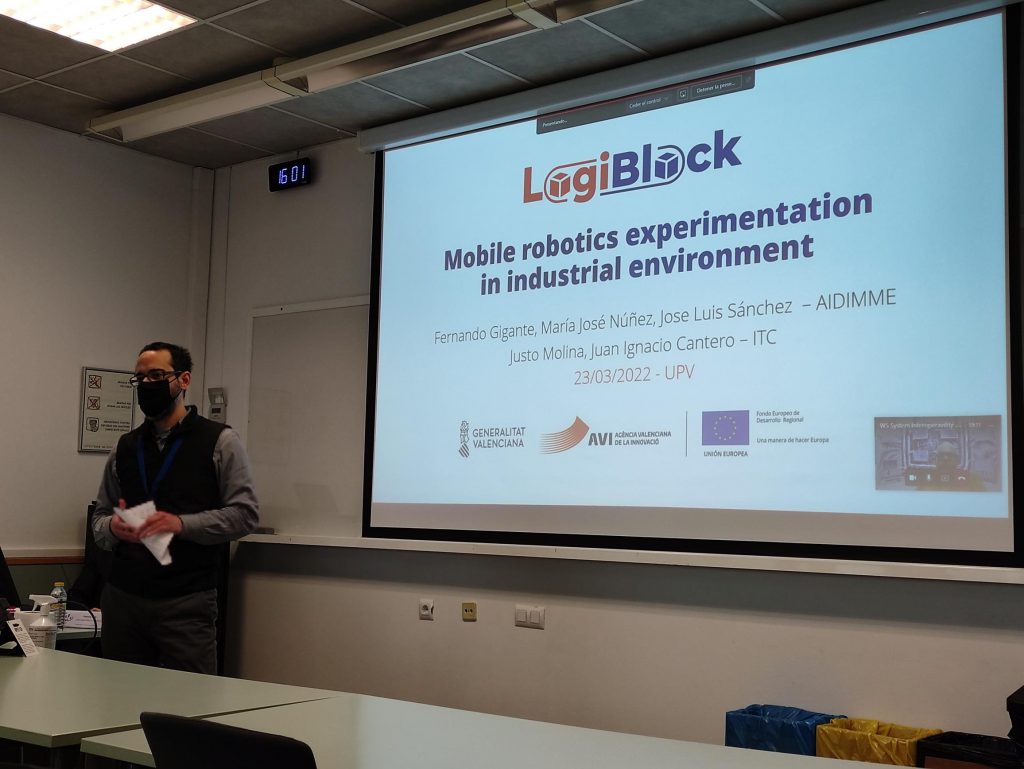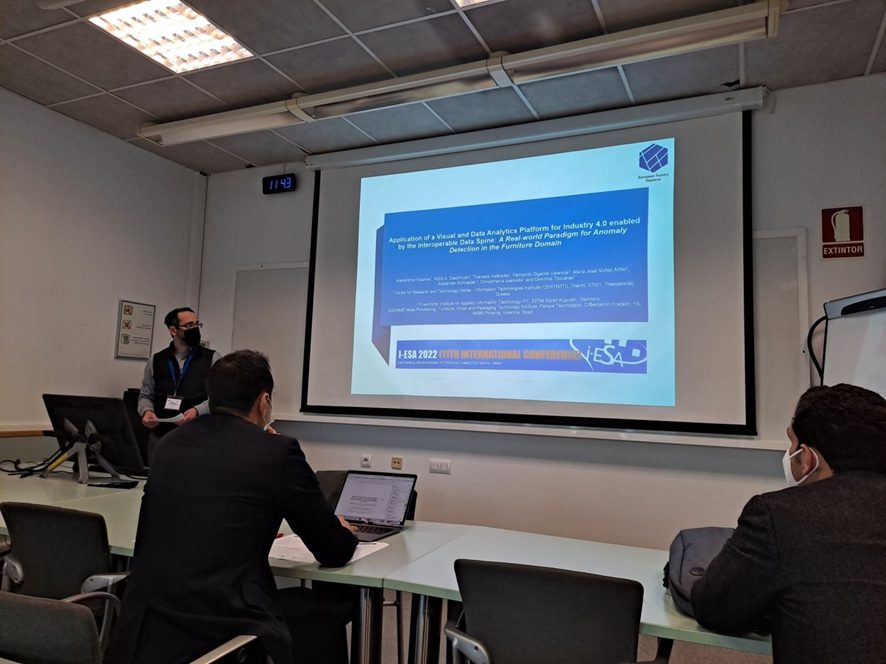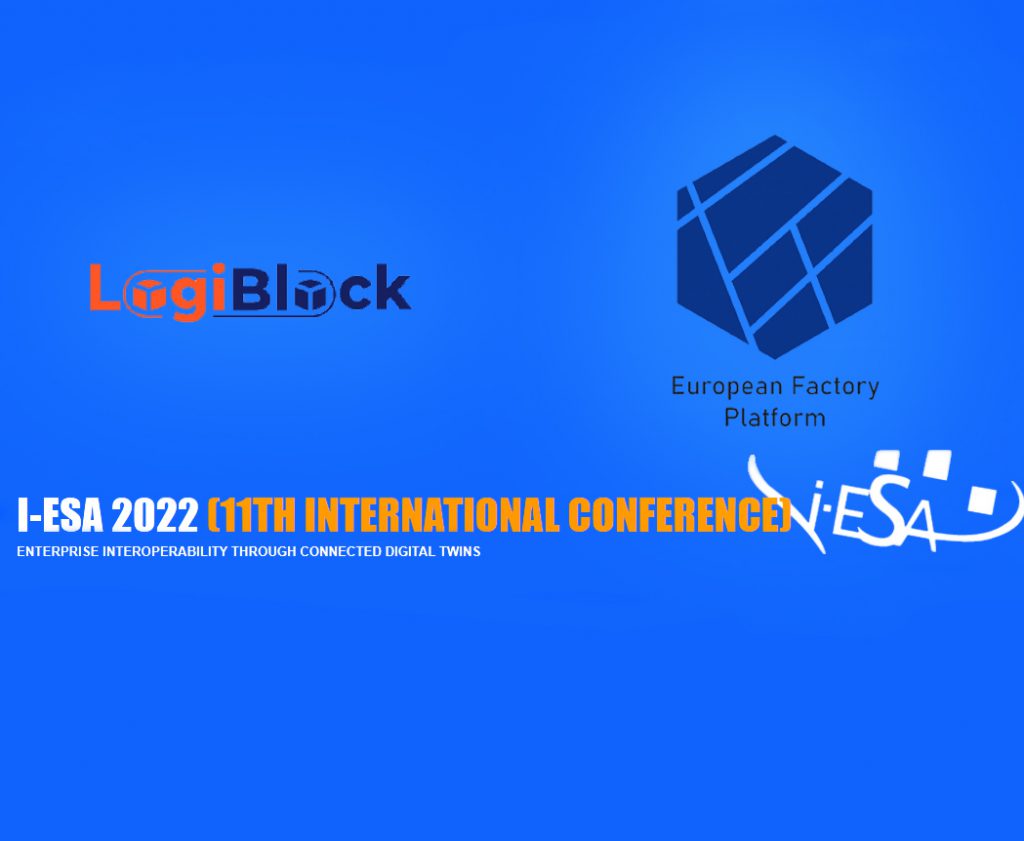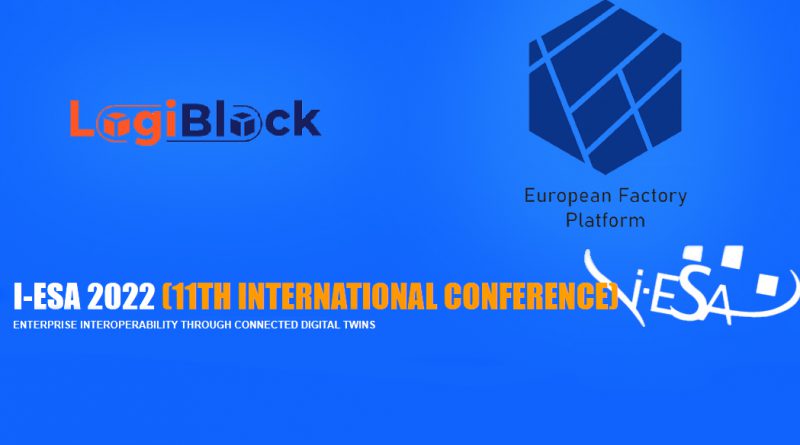AIDIMME participa en la I-ESA 2022
- Los pasados días 23 a 25 de marzo tuvo lugar la 11ª edición del congreso internacional IESA celebrada en Valencia.
- En el congreso que trata sobre la interoperabilidad para sistemas y aplicaciones empresariales, técnicos de AIDIMME participaron exponiendo presentaciones relacionadas con las actividades del Insituto.
A practical experience of AI Solution used to improve varnishing process efficiency in furniture manufacturing
El técnico de Tecnologías y procesos de AIDIMME, Juan Del Agua, expuso el artículo “A practical experience of AI Solution used to improve varnishing process efficiency in furniture manufacturing”, enmarcado dentro del workshop “Artificial Intelligence beyond Efficiency”.
En dicha presentación se mostró el resultado de una investigación donde se ha desarrollado un modelo predictivo para estimar la cantidad de barniz depositado (gramos por metro cuadrado) en una pieza de tablero plana.
Para llevar a cabo la investigación, se realizó una experimentación con una barnizadora de rodillos disponible en la planta piloto de AIDIMME. Con la información acumulada de sensores en diferentes puntos de la máquina, se aplicaron técnicas de inteligencia artificial para obtener el mencionado modelo predictivo.

Los asistentes a la jornada valoraron muy positivamente haber obtenido un modelo de gran precisión en una investigación aplicada a un proceso real.
Expertos en el campo de la inteligencia artificial identificaron como una de las barreras para la puesta en marcha en entornos industriales de este tipo de soluciones, la sensorización de maquinaria requerida para capturar datos y poder realizar el entrenamiento de los modelos.
Desde la experiencia de AIDIMME en éste ámbito, se indicó que la clave es contar desde el inicio del proyecto tanto con el personal de producción como de mantenimiento, y así identificar si la instalación de sensores externos va a incidir en la operativa diaria con la máquina en cuestión. Con el consenso e implicación de todos estos actores, pueden solventarse gran parte de los problemas derivados de ésta etapa.
Durante el congreso se expusieron iniciativas y resultados de investigación con objetivos similares, enfocados en el desarrollo de sistemas predictivos, como por ejemplo, del plazo de entrega en procesos de fabricación.
AIDIMME es experto en industria 4.0, siendo ésta una de las 9 líneas de I+D del Instituto.
Mobile robotics experimentation in industrial environment
Por otra parte, Fernando Gigante, técnico de Tecnologías y procesos de AIDIMME presentó el artículo “Mobile robotics experimentation in industrial environment”, elaborado entre los centros AIDIMME e ITC.
Éste presenta una breve descripción de las condiciones que deberían cumplir las soluciones de robótica móvil en entornos industriales, todo ello en el ámbito del proyecto LOGIBLOCK – Plataforma modular para el despliegue y gestión de flotas de vehículos autónomos y robots logísticos en pymes.

Para ello se muestran las características de la Industria 4.0, entre las que se incluye la necesidad de crear entornos colaborativos seguros donde operen trabajadores y dispositivos, lo cual permite mejorar la gestión de recursos y la productividad.
Se describen las características de los principales tipos de robots móviles utilizados actualmente en la industria, y la metodología utilizada para realizar el estudio, la cual consiste en la identificación de los actores clave, la elaboración de una encuesta dirigida a fabricantes, la definición de requerimientos que debe cumplir una solución de este tipo, y la detección de indicadores clave para evaluar el impacto de la adopción de estas soluciones.
Posteriormente, se introduce un escenario de experimentación de sistemas de robótica móvil industrial basado en el laboratorio de robótica de AIDIMME, además de un caso de uso focalizado en el sector de la cerámica.
Finalmente, se presentan las principales barreras que encuentran las empresas a la hora de adoptar estas soluciones, y las características más relevantes que éstas deben tener, así como aquellas acciones futuras a realizar relacionadas con este estudio.

Application of a Visual and Data Analytics Platform for Industry 4.0 enabled by the Interoperable Data Spine: A Real-world Paradigm for Anomaly Detection in the Furniture Domain
Este es el nombre del artículo también presentado por Fernando Gigante, de AIDIMME. En él describe los hallazgos iniciales de su trabajo en funciones avanzadas de análisis de datos utilizando la interoperabilidad proporcionada por EFPF Data Spine.
El artículo pertenece al proyecto EFPF, el cual realiza un ecosistema de fábrica inteligente federado al interconectar principalmente 4 plataformas de fábrica inteligente, del grupo FoF-11-2016, a través de un Data Spine abierto e interoperable.
Este es el nombre del artículo presentado por Fernando Gigante, de AIDIMME, y elaborado por los socios CERTH, FRAUNHOFER FIT y AIDIMME.
En él, se presenta un paradigma sobre la detección de anomalías en el sector del mueble, aplicable a otros sectores, demostrando la aplicación de una herramienta de analítica de datos a través del componente Data Spine (DS) que proporciona la interoperabilidad entre servicios.

Dicho componente, se ha desarrollado en el contexto del proyecto europeo EFPF (European Connected Factory Platform for Agile Manufacturing).
Tras una visión general de los temas a abordar, se describe la problemática actual relacionada con la interoperabilidad entre diferentes sistemas y cómo la DS permite dicha comunicación entre servicios de distintas plataformas, entre otros mediante la transformación de modelos de datos.
La arquitectura del componente es explicada en más detalle, representando un flujo de información que ejemplifica su aplicación en un entorno real.
También se describen brevemente algunos detalles de la herramienta de analítica utilizada (Visual and Data Analytics Tool), su utilización desde el punto de vista de usuario, y los algoritmos involucrados en el análisis de datos de máquina.
El caso de uso se representa a través de la empresa fabricante de mobiliario juvenil LAGRAMA.
Finalmente, se describen las conclusiones obtenidas a partir de dicha investigación.


I-ESA Interoperability for enterprise systems and applications
La conferencia internacional que acumula 11 ediciones ha elegido la ciudad de Valencia para celebrar su última edición, al igual que ocurrió en el año 2012.
La Conferencia I-ESA 2022 está organizada por la Universidad Politécnica de Valencia en representación de INTERVAL (Polo Español de INTEROP-Vlab) y el Laboratorio Virtual de Interoperabilidad Empresarial, patrocinado por la Federación Internacional para el Proceso de la Información y la Federación Internacional de Control Automático.
El encuentro es considerado una oportunidad de intercambio de experiencias sobre la interoperabilidad empresarial.


Para más información contacte con AIDIMME.
Visitas: 309

AIDIMME takes part in the I-ESA 2022
- Last 23rd and 25th of March, the 11th edition of the IESA international conference was held in Valencia.
- In this congress about interoperability in business systems and applications, the AIDIMME technicians presented the different activities the institute carries out.
A practical experience of AI Solution used to improve varnishing-process efficiency in furniture manufacturing
AIDIMME’s Technology and Processes technician Juan Del Agua presented the article ‘A practical experience of AI Solution used to improve varnishing process efficiency in furniture manufacturing’ framed in the workshop ‘Artificial Intelligence beyond Efficiency’.
The presentation exhibited the results of a research where a predictive model to estimate the amount of deposited varnish (grams per square metre) in a flat board was developed.
To conduct this research, an experiment with a roller-coating machine available at AIDIMME’s pilot facility was carried out. With the gathered information of the sensors in different parts of the machine, artificial intelligence techniques were applied to obtain the mentioned predictive model.

The attendees appreciated obtaining a highly accurate model in a research that applied to a real process.
Experts from the artificial intelligence field recognised that one of the main problems to initiate these solutions in industrial environments is the machine sensorisation required to capture data and carry out model training.
Given the experience in this field, AIDIMME explained that the key is to have from the beginning of the project the production and maintenance staff, to help identify if the external sensor installation will influence the machine’s daily operations. With the agreement and commitment of all the parts, many of the problems derived from this stage can be solved.
During the congress, many research initiatives and results with similar objectives were presented, focusing on the development of predictive systems such as the delivery period in the manufacturing process.
AIDIMME is a specialist in the Industry 4.0 since it is part of the nine points in the Institute’s research and development projects.
Mobile robotics experimentation in industrial environment
Fernando Gigante, Technologies and Processes technician at AIDIMME, presented the article ‘Mobile robotics experimentation in industrial environment’ drafted by AIDIMME and ITC.
It featured a small description of the conditions that the solutions in mobile robotics in industrial environments must accomplish, which are included in the scope of the LOGIBLOCK – Modular platform for the management and display of autonomous vehicle fleet and logistics robots in SME project.

To this effect, the characteristics of the Industry 4.0 were displayed, including the need to create secure collaborative environments where workers and devices can operate in order to improve resource management and productivity.
It described the characteristics of the main types of mobile robots currently used in the industry and the methodology used to carry out the research: identifying key actors, developing a survey for the manufacturers, defining the requirements that a solution of this type must meet, and detecting key indicators to evaluate the impact of implementing these solutions.
Subsequently, a testing scenario of industrial mobile robotics systems based in the robotics laboratory at AIDIMME was introduced, along with a usage case in the ceramics sector.
Lastly, it presented the main obstacles found in enterprises when they adopt these solutions and the main aspects they should include, such as the future actions they must conduct related to this research.

Application of a Visual and Data Analytics Platform for Industry 4.0 enabled by the Interoperable Data Spine: A Real-world Paradigm for Anomaly Detection in the Furniture Domain
This name belongs to the article presented by Fernando Gigante from AIDIMME, describing the initial findings of his work in advanced analysis functions using interoperability provided by EFPF Data Spine.
The article is part of the EFPF project which conducts a federated smart manufacturing factory ecosystem by mainly interconnecting four smart factory platforms from the FoF-11-2016 group through an open and interoperable Data Spine.
The name belongs to the article presented by Fernando Gigante from AIDIMME and drawn up by CERTH, FRAUNHOFER FIT and AIDIMME associates.
It presents a paradigm about the detection of anomalies in the furniture industry – which also applies to other sectors – demonstrating the implementation of an analytics tool via the Data Spine (DS) component that provides interoperability between services.

This component was developed in the context of the EFPF (European Connected Factory Platform for Agile Manufacturing) European project.
After an overall perspective of the topics to be discussed, the current problem related to operability between different systems is described, as well as how DS allows this communication between services on different platforms – such as via the transformation of data models.
The component’s architecture is explained in more detail, depicting a data flow that illustrates its implementation in a real environment.
Some details about the analytic tool used (Visual and Data Analytics Tool) are also described, as well as its deployment from the user’s perspective and the algorithms involved in the data analysis machine.
The use case is represented by the children’s furniture manufacturing company LAGRAMA.
Finally, the obtained conclusions from the research are described.


I-ESA Interoperability for enterprise systems and applications
The international conference, which has been going on for 11 editions, chose Valencia to be the host of the 2022 conference – as happened in 2012.
The I-ESA 2022 Conference is organized by the Universitat Politècnica de València on behalf of INTERVAL (Spanish centre of INTEROP-Vlab) and the Virtual Laboratory for Enterprise Interoperability, sponsored by the International Federation for Information Processing and the International Federation of Automatic Control.
The event offers the opportunity to exchange experiences in enterprise interoperability.


For further information contact AIDIMME.
Views: 309


